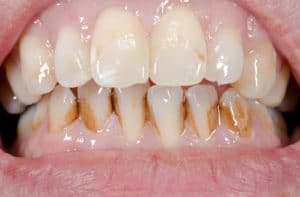
The dangers of smoking are well known to many people, but the particular dangers of smoking that affect dental health are somewhat less familiar. The Northfield Dental Group team would like to make you acutely aware of the risks that smoking and other forms of tobacco can pose for your teeth and health.
Gingivitis, Periodontitis and Leukoplakia
Multiple research studies have found that smokers are far more susceptible to contracting gum disease than non-smokers.
Two potential signs of oral cancer in its early stages include leukoplakia and gingivitis — early-stage gum disease. Gingivitis can cause dusky red or swollen gums that bleed easily, especially when you brush your teeth. Gingivitis may appear mild, but since it can be a precursor to more serious gum disease — periodontitis — it should be taken seriously.
Periodontitis produces pockets of pus that can also be a precursor to oral cancer. And many studies indicate that people who smoke are at far greater risk for contracting periodontal (gum) disease than non-smokers.
Leukoplakia can lead to thick, whitish patches that form on the gums, inside of the cheeks, bottom of the mouth and occasionally the tongue. Although most leukoplakia patches are benign, some show early signs of cancer. Raised, red lesions are more likely to show pre-cancerous symptoms.
Potential Consequences of Smoking on Oral Health
Other problems for oral health that arise from smoking include:
- Increased risk of oral cancer
- Bad breath
- Impaired flow of blood to the gums
- Tooth decay
- Buildup of plaque and tartar
- Loss of bone in the jaw
- Delayed recovery after tooth extractions and periodontal surgery
- Increased risk of gum disease and leukoplakia (white spots in the mouth)
Tongue Discoloration
Beyond the increased potential for serious diseases, smoking can cause unpleasant side effects such as:
- Buildup of plaque and tartar
- Black hairy tongue (a condition that causes the tongue to become yellow, green, black or brown and hairy)
To minimize some of the negative effects of smoking on oral health, smokers should use a toothbrush with stiff bristles, along with toothpastes and mouthwashes specially created for smokers.
It is advisable to check with your dentist if you have signs of changes in your mouth such as gray, red or white patches, or increased sensitivity to hot or cold foods. Please call the Northfield Dental Group at (973) 736-0111 to schedule an appointment if you have any concerns.




 Our Practice
Our Practice Our Doctors
Our Doctors Blog
Blog Special Offers
Special Offers Financing
Financing Testimonials
Testimonials